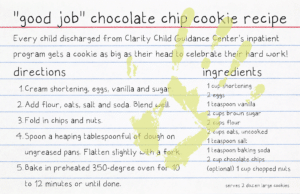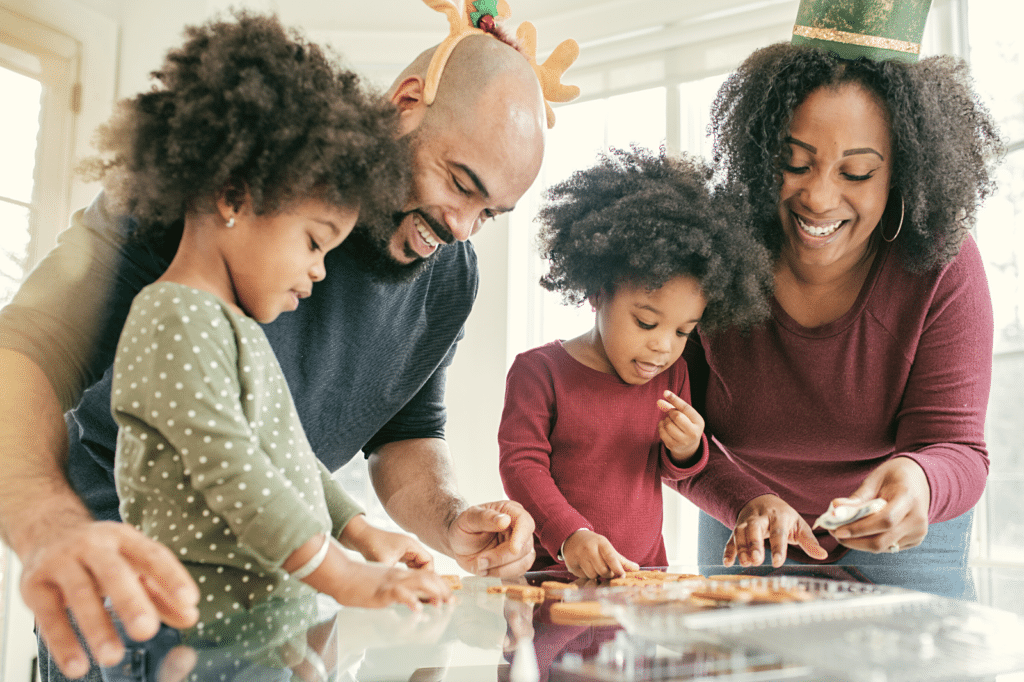Most of us love traditions. We may not have wondered why—we just know we enjoy them….especially around the holidays! It might be looking at lights; games with family; making Christmas cookies; picking out a tree; going to church or temple services; singing carols; or eating a turkey or ham dinner with all the trimmings.
Clarity Child Guidance Center also loves traditions, but for reasons that go beyond the initial reaction of “it makes us feel good.” We know how intrinsically important they are to all that take part, so we encourage all caregivers to nourish existing traditions, or make some new ones this coming year.
Why are traditions important? Most importantly, traditions create positive experiences and memories for everyone by nurturing a family’s connection and giving them a sense of belonging. They help children understand who they are and what is important to the family to which they belong.
Think back to a favorite tradition of yours as a child—even something as “regular” as dressing up for Halloween or as “special” as getting to choose the flavor of your birthday cake. It made you feel special….unique….extraordinary, which is exactly the point!
Besides making a child feel special, traditions can even contribute to a child’s self-esteem and enhance their well-being, which is no surprise to us who spend our lives observing children, but may be a new viewpoint to parents when it comes to traditions. Children find comfort and security when things are predictable and consistent, which applies to something as exciting as a holiday ritual.
That is exactly why Clarity Child Guidance Center has so many traditions that the staff look forward to as much as the kids in our care. Some occur around holidays: the Easter Egg hunt; Fiesta celebration; Halloween Costume Parade with treats; Thanksgiving supper; and December Holiday party with gifts and carols. 
Other traditions that Clarity staff have created include the popular “Good Job” discharge cookie which has been going on since the 1970s where a child going home after staying in our inpatient program gets a gigantic chocolate chip cookie as big as their head. We hope anyone reading this will consider making their own “Good Job” cookies to celebrate someone’s work.
A newer tradition is our Clarityfest where our courtyard turns into a celebration with kids games (including the popular dunk booth) and festival foods like burgers, Mangonadas, pizza and lots of other treats. At all of these traditions, it is hard to tell if the staff or the kids are having more fun…..just ask the staff who dressed up as the Beatles during the Clarityfest, or the team that dressed as Disney heroines at the Halloween parade.
Parents and caregivers, don’t think traditions have to be elaborate or cost money, nor do they have to evolve around holidays. They can be as simple as reading the same book at a certain time of year; taking a hike in a favorite park; volunteering together at a fundraiser; making an old family recipe; weekly or monthly movie night; arts and crafts; trips to see a friend or relative; Taco Tuesdays; mini-family reunions; family game night; etc.
Some of the best traditions are accidents—something done once and was so loved by the family that everyone wants to repeat it. See, you just made a tradition!
And it’s okay if traditions have to be modified as the kids grow up. Maybe the reading of a favorite book turns in watching the movie adaptation. This past year many of us had to visit with some relatives via Zoom or Skype instead of a physical get together. That is a tradition, even if virtual. It gives us all a chance to stay connected as a family, even if we physically can’t be together for the holidays.
And sometimes the preparations are just as important as the event itself: helping to make the turkey stuffing; decorating the house; making a birthday card for our grandparents.; picking out the Halloween costume. Even though holidays may be stressful for us as adults, keep the preparations as fun and light-hearted as possible so they are looked forward to—and not dreaded—by our kids (or you!)
All of this gives our kids a sense of stability as the same traditions are repeated again and again. It helps them understand sequence, and helps them manage change, which is difficult for some of our kids.
No matter what tradition you choose to recreate every year, or which new ones you create, just having something for your child to look forward to is what is important.










